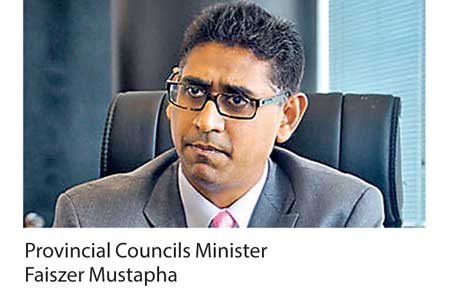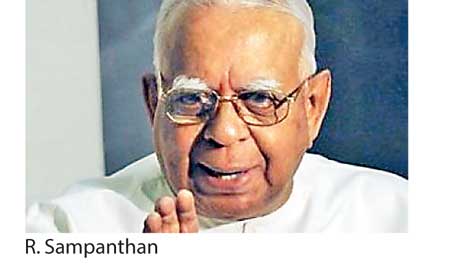Wednesday Feb 18, 2026
Wednesday Feb 18, 2026
Friday, 22 September 2017 00:10 - - {{hitsCtrl.values.hits}}

The Government yesterday denied that elections reforms were targeted at delaying polls and emphasised it would work to hold elections as soon as possible, with efforts to complete the provincial council delimitation process in four months.
Local Government and Provincial Councils Minister Faiszer Mustapha told reporters that the latest amendment to the Provincial Council Elections Act was only aimed at providing a definitive system for elections to be held. He also rejected claims that the amendment undermined the ruling of the Supreme Court over the 20th Amendment.
He acknowledged that the Government had ruled out holding a referendum to pass the 20th Amendment as they are more focused on the new Constitution and holding two elections in quick succession was not beneficial to the country. Mustapha also pointed out that the election system had to be opened up so that new politicians who are women and not part of dynastic politics would have opportunities.
“If a country that has 52% women cannot attract more women into politics then we are clearly not moving in a progressive direction. In the same way it is the intention of this Government to introduce a system that would provide fairness to everyone. No community would be disadvantaged by this new system,” he said.
He also charged that dissenting politicians were speaking more in self-interest but that the Government was focused on what was beneficial for the whole country. Therefore he argued that the new amendments were positive and stressed that the new system should also be expanded to introduce it to parliament so that all elections are held by the same structure.
“Following discussions in parliament some parties wanted the 60%-40% breakdown changed to 50% and we have decided to adopt this. The delimitation committee appointed by the president has to present their report in four months and when it is presented in parliament if it is not approved with a two-thirds majority there will be a second committee under the Prime Minister.”
The recommendations of the second committee would be gazette by the president, ending the delimitation process. However, he insisted that if there are any demands for changes, even after the second committee stage, the Government was ready to consider them.
“Passing this Act was a historic moment. It received a two-thirds majority in parliament and proved that this Government still has the power to bring divergent political parties together for the benefit of the country. This Act states that efforts must be completed in six months. Local Government elections will be held in January. We will work towards that,” he said.
Expired provincial councils will come under governors, he reiterated.
“We must be practical. We cannot have different provincial councils under different systems. That is a problem for the whole country, so as a Government we wanted to move the entire provincial council framework under one system.”
 Leader of Sri Lanka’s Opposition and main Tamil party the Tamil National Alliance (TNA), R. Sampanthan, yesterday assured that the unitary status of the island nation is perpetually safeguarded in the new Constitution and it is being done within the firm framework of a “united undivided and indivisible Sri Lanka”.
Leader of Sri Lanka’s Opposition and main Tamil party the Tamil National Alliance (TNA), R. Sampanthan, yesterday assured that the unitary status of the island nation is perpetually safeguarded in the new Constitution and it is being done within the firm framework of a “united undivided and indivisible Sri Lanka”.
“Sri Lanka would perpetually be a united, undivided and indivisible country in keeping with the basic and supreme law of the country, and on the basis of the free will and consent of all its people,” the Opposition Leader said.
Issuing a statement following the submission of the interim report of the Steering Committee to the Constitutional Assembly today by Prime Minister Ranil Wickremesinghe, Sampanthan pointed out that the new Constitution has thus far been framed for Sri Lanka on the basis of a substantial bipartisan consensus amongst its different people, in particular the Tamil people or on the basis of such bipartisan consensus between the two main parties and other political parties.
He emphasised that the present exercise in Constitution-making presents the first such opportunity.
“A Constitution based upon such a reasonable consensus would give the Constitution, the basic and supreme law of the country, a legitimacy and credibility which the country direly needs,” the Opposition Leader said.